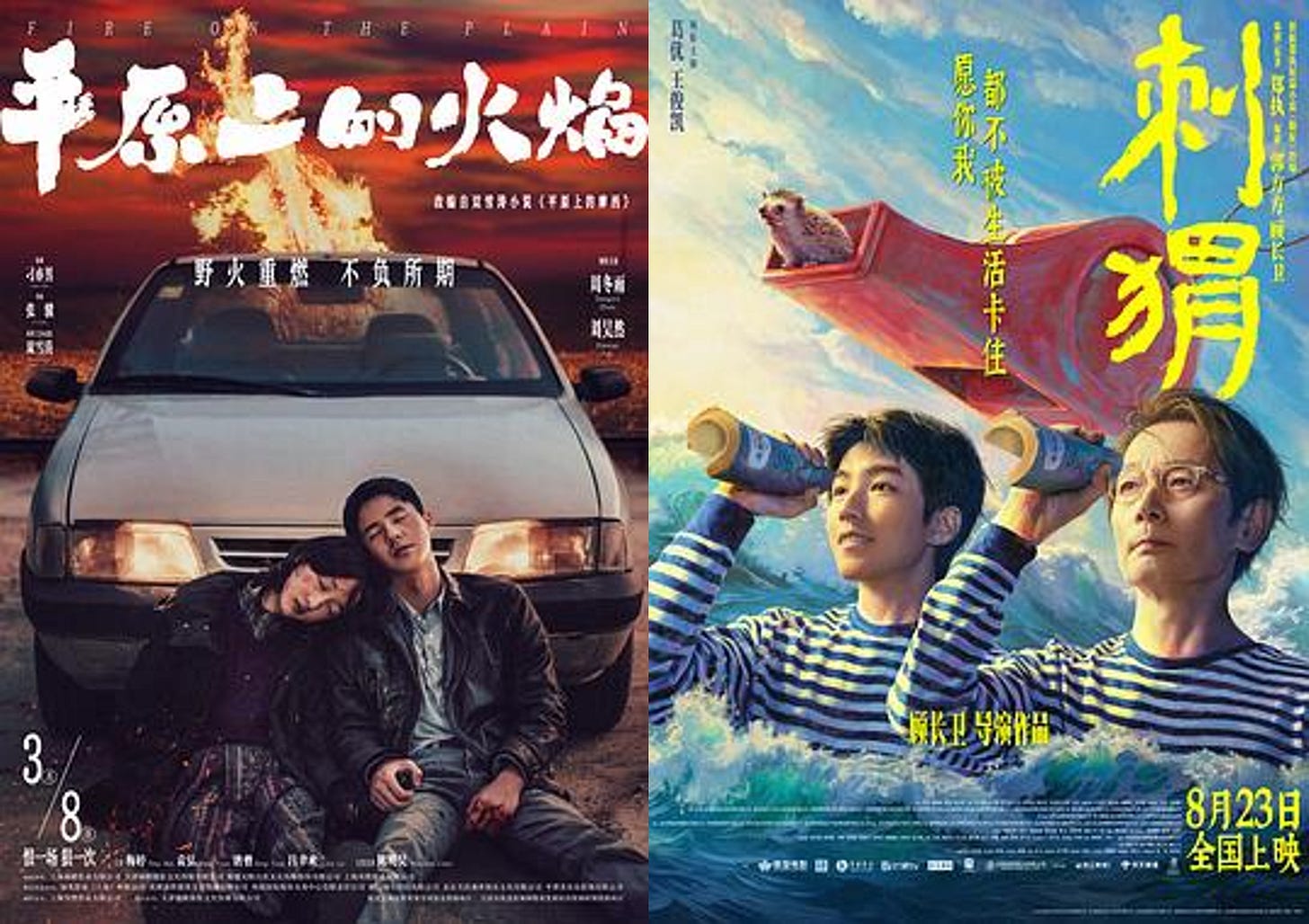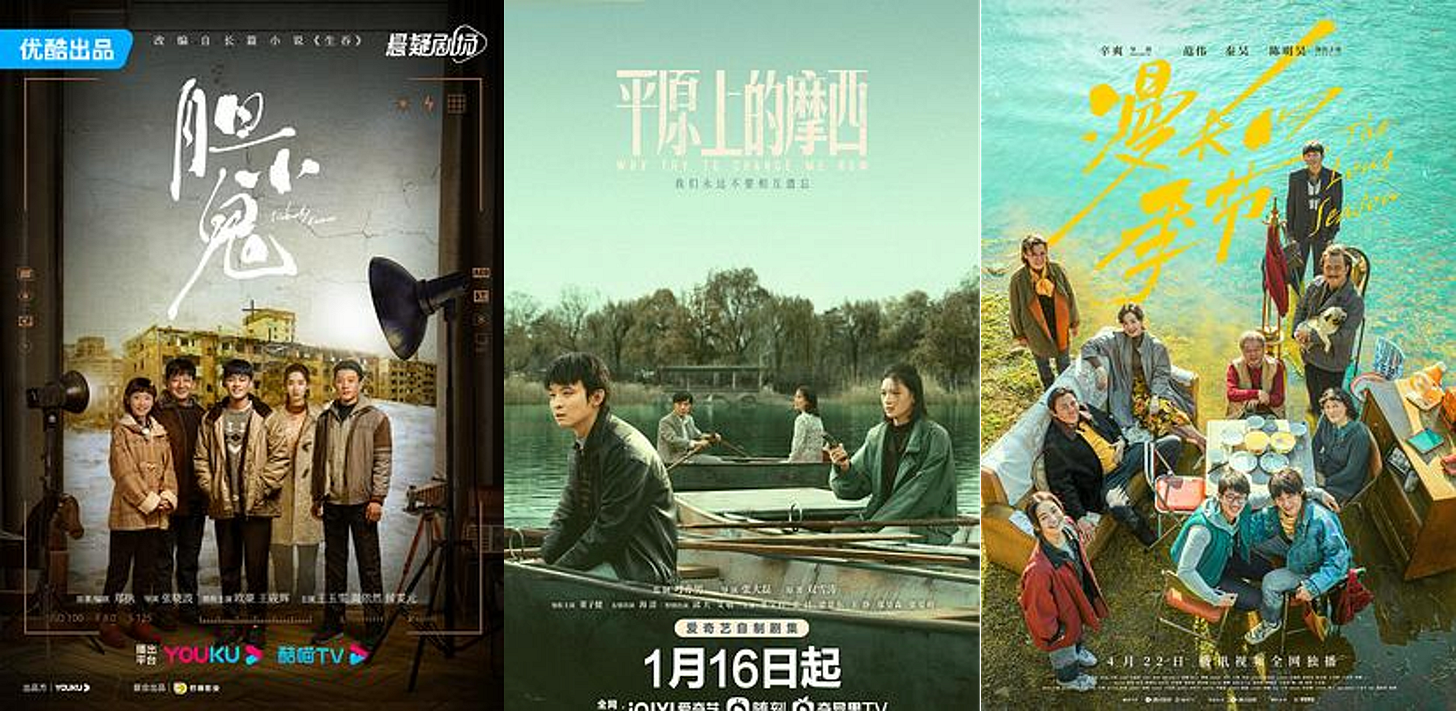CWN#5.5: An Audiovisual Guide to the Dongbei Renaissance
Welcome back to the Cold Window Newsletter! This is a shorter interim issue to tide you over between my main more-or-less-monthly features. Thanks for reading as always.
More than a decade into the Dongbei Renaissance, several writers associated with the movement have publicly expressed an interest in moving beyond the regional themes that made their reputations. Shuang Xuetao’s latest collection, Uninterrupted People 《不间断的人》(2024), swapped out Dongbei settings in favor of Beijing. Ban Yu says the stories he wants to tell about Shenyang’s laid-off generation have mostly already been told, and Zheng Zhi hasn’t published a Dongbei-inflected fiction collection in years.
And yet the storm of Dongbei popular cultural production that these authors helped inspire continues to rage around them. The Dongbei Renaissance has always been a cross-media phenomenon, and that’s only become more true as the movement’s major literary works have begun to accrue screen adaptations in recent years. I thought I’d share with you a quick guide to some of the representative products outside of literature that have helped turn Dongbei into a national cultural juggernaut. This is far from an exhaustive list—given how blurry the boundaries of this movement are, it’s probably not possible to make an exhaustive list in the first place. Take it instead as a starter pack of media that operates along the same geographic and aesthetic lines as the working-class, post-industrial, funny-tragic literary works of Shuang, Ban and Zheng. And if you’ve got more recommendations along these lines, please share!
Film:
I admit, I haven’t seen the Shuang Xuetao and Zheng Zhi adaptations a few entries down, but I sure hope they do their excellent literary source material justice.
《铁西区》 Tie Xi Qu: West of the Tracks (2002): a legendary 9-hour documentary by the filmmaker 王兵 Wang Bing documenting the postindustrial decline of Shenyang in the early 2000s, paving the way for Shuang Xuetao and others to explore similar narratives in their fiction
《钢的琴》The Piano in a Factory (2010): a masterful movie that precedes the Dongbei Renaissance proper, but explores the very Ban Yu-style theme of a laid-off father struggling to care for his child and stumbling across unexpected beauty amid post-industrial despair
《平原上的火焰》 Fire on the Plain (2021): a film adaptation of Shuang Xuetao’s 《平原上的摩西》 “Moses on the Plain” that is currently struggling a bit in its Douban ratings. Its general release in theaters was delayed until this spring, for reasons I have heard rumors about (some sort of scandal involving a lead actor?) but cannot find confirmed online.
《刺猬》The Hedgehog (2024): a film adaptation of Zheng Zhi’s story 《仙症》 “Divine Disease,” which memorably features a hedgehog crossing a road (...poor hedgehog)
Television
I admit, I have not seen any of these yet, not even The Long Season. But listen, this is not a television newsletter, so you’ll just have to track them down and judge their quality yourself!
《胆小鬼》 Nobody Knows (2022): the well-received television of Zheng Zhi’s suspense novel《生吞》 Victim in Me, following a group of classmates for ten years in the wake of a murder
《平原上的摩西》 Moses on the Plain (2023): a much more widely approved-of television adaptation of Shuang Xuetao’s novella than the film above
《漫长的季节》The Long Season (2023): one of the most lauded Chinese television series in recent years, produced in consultation with Ban Yu (and sharing a title with one of his otherwise unrelated short stories)
Music
宝石GEM: a Dongbei rapper known for his viral hit “野狼 DISCO,” which was an early peak of Dongbei cultural virality on the Chinese internet
孙次郎 OuttaWave, another rapper who mixes a London drill flow with Dongbei pride on his recent album 《我说白了》.1 Enjoy some lyrics from the track 《根儿》, which I’ll transcribe here untranslated because there’s no way I can do justice to his rhymes and flow in English:
出生在东北活在东北
那就讲点在东北发生的事儿
给手机备忘录写点词儿
给无聊的生活解解闷儿 ……
Yo, 东北文艺复兴我来带头开干
锅包肉,铁锅炖大鹅
今晚隔炕头开饭
你觉得好吃就多吃两口
真觉得难吃也没啥事儿
反正我做的是东北菜
外地人吃着也挺带劲儿
See also: 二手玫瑰 Second Hand Rose, the zany and subversive rock band that burst into the mainstream on season 3 of rock reality competition The Big Band 《乐队的夏天》. I’m on the fence about whether this band can properly be categorized as part of the Dongbei Renaissance—there is just so much going on with them, from traditional instrumentation to gender fluidity to the hilarity and bizarreness of their stage presence, that I’m not sure I can categorize them as anything. But it’s undeniable that they’re a hugely visible part of the creep of Dongbei cultural elements into mainstream pop culture.2
Podcasts
Try out this episode of GQ Talk 《智族Talk》, in which 宝石GEM coins the term “Dongbei Renaissance” in conversation with Ban Yu
Videos
We’re now miles away from my literary area of expertise, but I can’t neglect to mention that Dongbei cultural dominance has happened largely over video platforms like Douyin (TikTok) and Kuaishou. Here’s a Youtube reupload of a viral Bilibili video from 2018 (a remix3 of skits by classic Liaoning actor Zhao Benshan) to give you a taste of this side of the Dongbei Renaissance:
In the next full issue of the newsletter, we’ll check in with recent regional literature from China’s southern provinces and get totally overwhelmed by the world of internet fiction. See you then!
Concrete Avalanche and Active Faults have a conversation from a few years back that’s super insightful on how this band performs insanity in their shows. You should go read it.
warning: catchy





